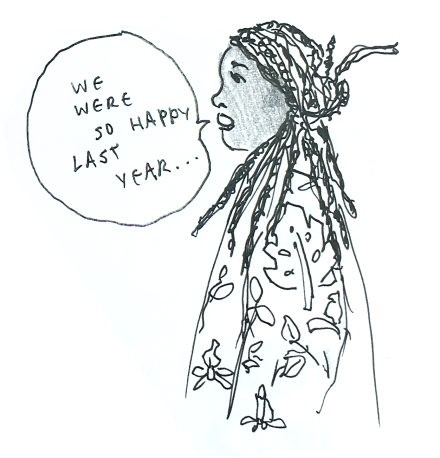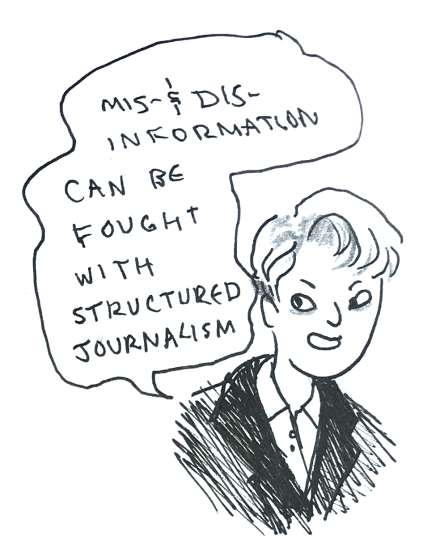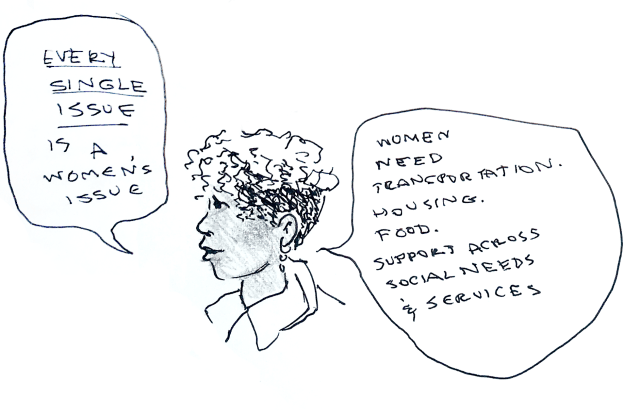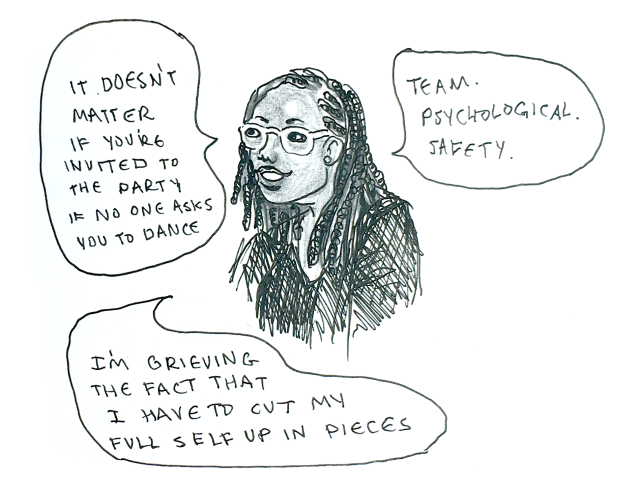I thought the last Lesbians Who Tech Summit in New York City was the most political, progressive technology summit I would ever attend. I was wrong. This Lesbians Who Tech Summit was about kicking ass, resisting and being queer. And somehow, SOMEHOW, technology companies help fund this beautiful, beautiful cabal of badass folks standing up and talking about how big data repeats racist patterns, how math is weaponized against marginalized communities, how science fiction can forecast our worst futures and how technology can keep connecting queers with healthcare, lawyers and each other.
So how do I talk about two days worth of talks? Honestly, the whole thing is relevant to your interests, friends, the whole summit. So before I go and list my favorite things that happened, I want to tell you that you can see snippets of it on Lesbians Who Tech’s Periscope channel. I also want you to know that I missed some things because I got horribly ill smack in the middle of the conference, but luckily, I was joined by fellow Staff Writer, Raquel Breternitz, who was right there with her thoughts when I had to peace out. Alrighty, ready? Here are my very favorite things about this year’s Lesbians Who Tech Summit NYC.
The Emcees Ran Out of Fucks

Illustration of Danielle Moodie-Mills by Raquel Breternitz
And I’m talking in the best way. The very, very best way. The emcees of any event are supposed to set the tone, and in this fraught political climate full of literal Nazis, Andrea Minkow and Danielle Moodie-Mills did the perfect job of pumping us up and saying what we were all thinking: this blows, this world right now, it just sucks. Moodie-Mills specifically balanced that saying what we were all thinking with an irreverent, comedic tone that let us still have a conference while the world burned around us. And boy am I glad she did make it okay, because a lot of important information was shared up in here. Also here is Minkow in a child-sized bird costume just in case you needed that today:
The Emphasis on Narrative
Perhaps I am coming at this from a very specific place in the world—I’m a professor who teaches digital storytelling. The intersection of technology and narrative is where most of my brainpower goes. But the emphasis on the impact of story on technology was tantamount to the overall thesis of this conference. Erica Anderson from Google News Lab talked about the actual engineering of trust in the form of engineering for fact checking and fast news. And while she’s shared some of the same information before (like, for instance, the resources over on First Draft that literally everyone who interacts with and creates news online should go look at), it’s taken on a new weight in the age of fake news and fake Presidents.

Illustration of Erica Anderson by Raquel Breternitz
Alida Draudt talked to us about how the United States Army employs futurists, a.k.a. science fiction storytellers and speculative geniuses, to come up with narratives for our very worst futures. This is a job I did not know existed until this Summit. Like, I was aware of futurists as a concept. This is not a thing I really recognized they did. It was super interesting to know, that fiction writers influence where our collective brains go in that way. Here’s a little piece of Draudt’s talk, which occasionally did get a little United-States-centric for me, but was full of stuff I had never considered before:
Futurists. Threatcasters. They make a story about a person with a challenge. #lwtsummit pic.twitter.com/uKz2GORhbO
— Austen E. Osworth (@AEOsworth) September 8, 2017
And I loved the panel entitled The New Normal: Social and Political Disruption in the Trump Era, moderated by Megan Murphy of Bloomberg Businessweek and featuring Michelle Ortiz of Emily’s List and Angélique Roché of the Ms. Foundation for Women. It was Roché who began to talk about getting specific in political speech, and never has it been more apparent that specific is how you reach the universal. You don’t try to appeal to everyone; you get specific. It’s the same in a novel as it is in politics as it is in threatcasting as it is news reporting as it is in a technology conference. Humans love stories. No amount of logic and technology will change the fact that we are story creatures.

Illustration of Angélique Roché by Raquel Breternitz
Tiffany Dockery’s Talk

illustration of Tiffany Docker by Raquel Breternitz
I’ve done broader themes for this recap than I have in the past, but I just need to give a shout out to Tiffany Dockery‘s talk, entitled A Seat at the Table: How Inclusive Diversity Has Transformed My Experience in Tech. Never has being at Lesbians Who Tech felt more like being in church. She said perhaps the best thing about diversity in technology that has ever been said. She called out the idea that the diversity that we should really be going for in the tech sector is diversity of thought. It’s a thing people say. I’ve heard it with my own personal ears. So what does Dockery think about that? “If we just solved racial, gender and sexuality diversity in tech, you know what we would get for free? Diversity of thought.” She also said something that resonated with me, personally: “I’m grieving the fact that it took me eight years to feel like I belong in this industry.” I never felt like I belonged in the industry for about a million reasons. So I left. I’m in awe of those who can stick around eight years on just the hope that it’s going to get better. And I’m so glad Dockery is one of the folks at Spotify. She’s one of the reasons it’s getting better at all. Gosh, what an amazing human person.
Weapons of Math Destruction
Speaking of narrative, while I’ve heard talks about the flaws of big data, none have been so specific as Cathy O’Neil’s Weapons of Math Destruction How Big Data & Algorithms Increase Inequality and Threatens Democracy. If we are actively influencing technology and the political landscape with narrative, we are also doing so unintentionally by believing math to be objective. She said something that stuck with me and I want to share it with you: “Mathematical algorithms are opinions embedded into code.” What I love about this conference is how human it is. There’s never any pretending that we, our whole bodies, identities, opinions, and selves aren’t all over our work. One of the ways in which this conference is so radical for a technology conference is how technology critical it is. I love that about every Lesbians Who Tech Summit I attend, but particularly this year.
The Balance Between “Practical,” “Hard” Tech and Resistance
Biggest cheer of the day: "My name is @staceyabrams and I'm running for governor of Georgia." #lwtsummit pic.twitter.com/9AmeCH0L9l
— Austen E. Osworth (@AEOsworth) September 8, 2017
In the same conference, I heard the most concrete and specific talk by Caitlin Kalinowski of Oculus and Facebook on iterating in product design AND ALSO a keynote by Georgia Gubernatorial Candidate Stacey Abrams entitled Where Allies Fear to Tread: Speaking Truth at the Ballot Box. Abrams talked about the relationship between the queer community and allies in politics. It was so powerful and gosh I hope she wins. Which brings me to my last point—
How the Ideas Are Gonna Travel
When I met up with our own Alex Vega, we sat in the livestream lounge and talked while listening to talks (a FABULOUS addition to the Summit layout, by the way, that livestream room. It meant we could catch up with folks and network without missing any of the talks on the mainstage). One of the things that Vega told me was that when she returns to her place of work, she does a small presentation on the conference. Which means that the last time she came to the New York City Summit, she was able to put a slide up with Janisa Gabriel on it and talk about designing Black Lives Matter. To folks who work in corporate America.
It was literally something I’d never considered before Vega told me that’s what she does after every Summit. How many other people are doing the same things? I’d wager at least some (and if you do this, you should leave a comment telling me so). Which means that the fact that is the most radical technology conference I’ve ever attended is actually spreading these radical notions to places they might otherwise not reach. I am so skeptical of the idea of disruption; I don’t think we think enough about what kinds of things can and should be disrupted. But founder Leanne Pittsford may have disrupted something here pretty significantly, and for the better. A conference that centers queer women and non-binary folks, and whose speakers are 50% women of color, works its way into so many mainstream technology spaces. That’s just so cool.
Here’s Raquel with Some Words—

Illustration of Pearl Means by Raquel Breternitz
Unfortunately, I fell ill partway through Lesbians Who Tech and couldn’t continue to sit in the mainstage theatre. It means I missed two things I desperately wanted to see: Megan Smith, former Chief Technology Officer of the United States in conversation with Pearl Means, Standing Rock Leader, and our own Raquel Breternitz’s talk entitled Digital Accessibility: Both Harder and Easier Than You Think. Luckily, Raquel also works here and she had time to add both her voice and her wonderful illustrations (seriously, sit next to Raquel at all conferences, it’s charming and joyful) to the piece. Here’s what Raquel said when I caught up with her on the second day of the Summit:
I have to say, it was really amazing to see Megan Smith speak with Pearl Means at the end. It was so impactful. I was tearing up—and though I held myself in, it’s the only conference I know of where I would have felt safe, and understood, crying in the first row.
And it was so awesome to speak today—the room was PACKED and when I told them it was my first talk, ever, everyone cheered for me! I was so touched. They’re so kind and supportive. It’s one thing to say you’re in a room full of brilliant queer folx in tech, but it’s another thing entirely to be sitting in that room and feeling that energy and that reality.
A little bit more about my talk—I did a really quick overview of the history of access for differently-abled people (including how activists, like total badasses, smashed city streets to great accessible ramps), some myths about digital accessiblity (don’t even try to tell me it’s “not a business priority,” mister!), and finally, some tips on how to be a better advocate for accessiblity in product, whether you’re a designer, developer, product manager, or otherwise. My favorite outcome of this were all the people who walked up to me afterward to share their own stories, both triumphs and hardships, with accessibility, personal access, loved ones who have needed different levels of access, and more. So many people gave advice, asked for help and support, and generally approached everyone with a smile and on open hand.
As a natrually introverted person who has struggled at conferences and networking events in the past, this event was a phenomenal breath of fresh air. I felt like I was among my people—and more than that, I knew that we were all there because we love what we do, and we’re good at it. That’s huge. Who would have thought when I was growing up and scared to sign up for science classes that my image of who gets to be in Tech could be so full of queer women and women of color—literally all of whom have amazing hair?!
I really feel I couldn’t be luckier.
Once again, the people at the Lesbians Who Tech Summit are the best part. Until next year!
Save



1. These illustrations are so great! 2. Hi Ali, sorry to hear you fell ill during the summit! 3. Raquel’s talk was a major high point of my weekend. I think their deck was one of the best and most affective that I’ve ever seen. Kudos Raquel, please keep presenting your perspective and your work – it was incredibly impactful! I’ve brought it back to my team and will be implementing a great deal of it.
Ahhh thank you so much! That seriously means a lot to me. I’m so glad you enjoyed, can’t wait to hear about how y’all implement these things at your company!
Such great information and thanks for linking to Raquel’s slideshow on digital accessibility. So right that ACCESSIBILITY IS NOT A FRINGE ISSUE!
Damn right
This was a great article! I watched the livestream from work on Friday, and it made me wish I was there! I’ve been trying to figure if I can go next year! (And also potentially give a talk about it at work after, like you mentioned Alex Vega doing)
I hope that you do!
Yup, I’ll be presenting to the people in my office what I learned at the Lesbians Who Tech Summit. Any suggestions for how many times I should say the word “lesbian”?
It was fun to be so excited by Rachel’s talk and then look her up on Twitter only to find I already following her because it’s Rachel from Autostraddle ?
I hope you’re feeling better, Ali!
Also I hope I can give a presentation that does LWT justice.